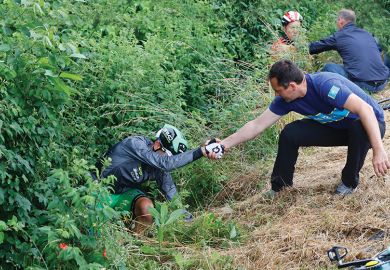“It was like being a football player with a broken leg for the past year,” reflects Stefano Bloch on how his research into policing, gangs and graffiti subcultures ground to a halt last year.
With Covid putting a stop to the street-level research that defined his gritty style of fieldwork – which typically included joining ride-alongs with police officers and interviewing graffiti artists in search of their next tag – Dr Bloch, a cultural geographer at the University of Arizona, devoted more time to analysis of data and past fieldwork. “You had to use your time for watching game films and memorising plays or else the year would be a total loss,” he said, continuing the injured-sportsman motif.
However, like many social scientists faced with a near-total block on fieldwork last year, he began to experiment with whether a new, socially distanced form was possible. In his case, he went for walks or drives to observe the streets where he is studying how racial groups are displaced by gentrification.
“Rather than rushing from person to person and place to place, scholars like me had to see things in new ways and extract data where and however we could,” said Dr Bloch, who added that “slowing down and valuing observation is something I will take with me after Covid is over”.
Bradley Garrett, whose studies have included living with London’s “urban explorers“ and visiting doomsday preppers across the world, also tried to adapt his research method to fit with the socially distanced times, but he found it difficult. “I tried to attend a few virtual events or interview people over Zoom, but it felt shallow,” said Dr Garrett, a social geographer at University College Dublin.
“The best ethnographic research is produced through living with people rather than just talking to them − it’s only after days and weeks, once they’ve warmed to the researcher, that people start to bloom, and I just wasn’t able to do that,” he said.
With traditional fieldwork still off limits, Dr Garrett recently ran a series of remote overseas field courses for students, including a project focused on urban crime in which his group witnessed an offence live on Zoom.
“I did everything at a distance and things worked out well, but it wasn’t ethnography,” he reflected.
Others are happier with the results seen since shifting their studies online, explained Deborah Lupton, head of the interdisciplinary Vitalities Lab at UNSW Sydney. Her crowd-sourced Doing Fieldwork in a Pandemic guide offers dozens of suggestions on alternative ways of conducting research, including studying Facebook groups, Twitter and podcasts, conducting interviews via online computer games and collecting data using digital diaries and geospatial technologies.
Switching to online methods during the pandemic allowed her team to “continue conducting ethnographic projects during periods of physical isolation and restrictions, but also more easily find participants to engage in interviews or group activities from all around our vast continent, including in rural and remote regions, due to not requiring travel”, said Professor Lupton.
However, she did point out that “all research methods have their pros and cons”.
For instance, using a videoconferencing app to conduct virtual home visits “meant we had to rely on what the participant holding their phone decided to show us, which was a major difference compared to when, pre-Covid, we were actually present in their homes, holding a video camera that we could point in the direction we chose”.
Researchers also find it harder to access marginalised groups or people willing to talk about sensitive subjects, such as sexual activity, mental health or family violence, as this generally involves creating a special rapport with individuals, added Professor Lupton.
“If participants do not have good access to digital devices or wi-fi, and if they have reason to be concerned about digital privacy, [it can mean] interviews cannot take place,” she added, while also admitting that “online methods do not suit all projects or all participants”.
Clare Southerton, a postdoctoral fellow at the Vitalities Lab whose research has drawn on YouTube videos for qualitative data exploring youth issues, said researchers should remain sceptical about content presented in such videos − but that the same rule applied for information captured by more established means.
“As social scientists we always have to be aware that what we get access to in an interview with a participant is only ever what a person wants us to know,” said Dr Southerton.
“Participants can present us with idealised narratives of their lives, just as YouTubers can – at times – present idealised images of their lives, though YouTube is certainly very professionalised,” she said, adding that researchers could still gain valuable insights because “what a YouTuber chooses to highlight in their content is also telling”.
Despite scepticism in some quarters about use of this kind of social media, she said that “if we don’t explore it, we’re really ignoring a significant realm of social life” and that she hoped the “pandemic conditions have created an opportunity for scholars to get outside of their own disciplines and take inspiration from the theoretical frameworks and methods of other disciplines”.
“For those of us already working with digital technologies and on digital platforms, like social media scholars, it’s an opportunity for us to help colleagues who might be wanting to adapt their research to use digital methods and to ensure they do it in ways that remain ethical and appropriate,” she said.
POSTSCRIPT:
Print headline: Insiders’ guide to online fieldwork
Register to continue
Why register?
- Registration is free and only takes a moment
- Once registered, you can read 3 articles a month
- Sign up for our newsletter
Subscribe
Or subscribe for unlimited access to:
- Unlimited access to news, views, insights & reviews
- Digital editions
- Digital access to THE’s university and college rankings analysis
Already registered or a current subscriber?




